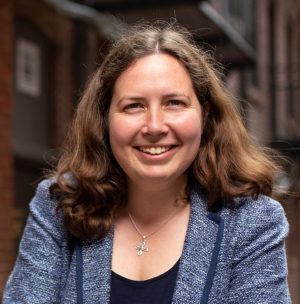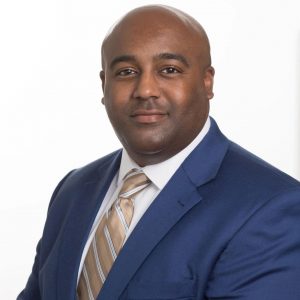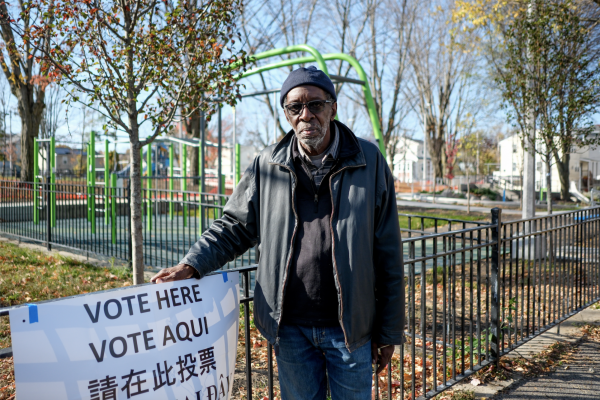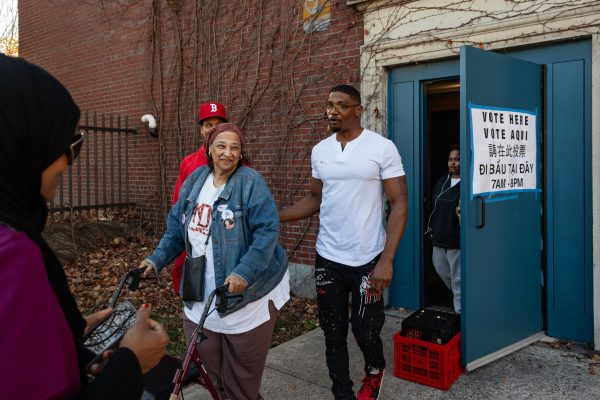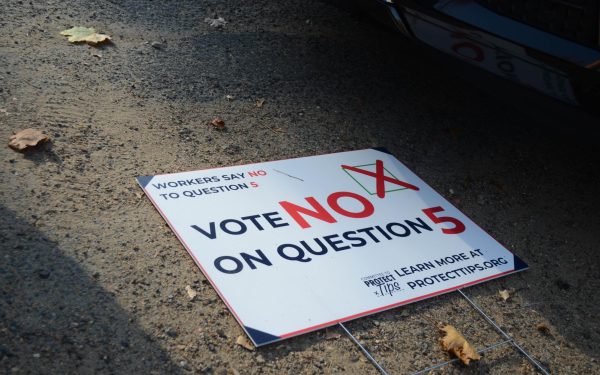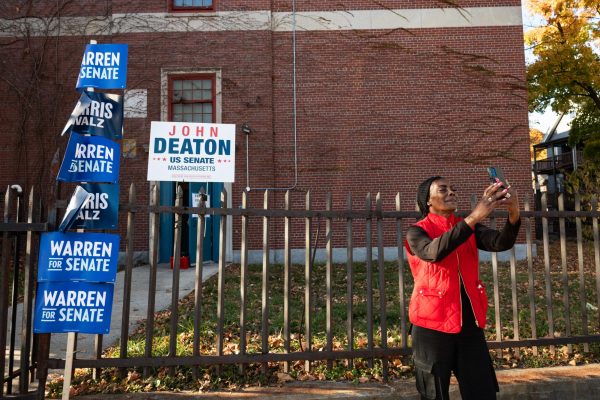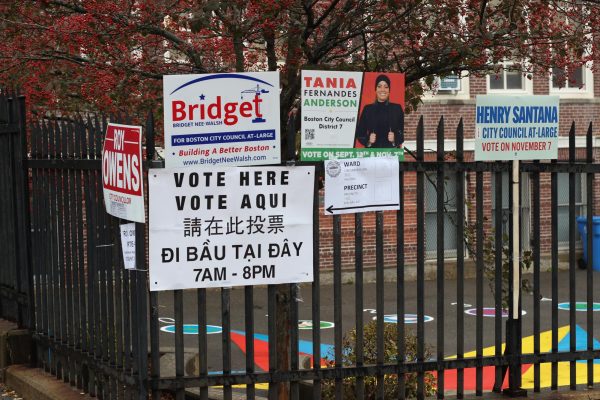City council race: Tania Fernandes Anderson running for District 7
Tania Fernandes Anderson, entrepreneur and the executive director at Bowdoin Geneva Main Streets, is running to represent District 7 in the City Council.
Anderson is running against Angelina Camacho, Leon Rivera, Brandy Brooks, Marisa Luse, Lorraine Payne Wheeler and Joao DePina. The incumbent Councilor Kim Janey, who was also council president, is running for mayor of Boston while currently serving as the acting mayor after former Mayor Marty Walsh was selected to be a part of President Biden’s cabinet as the Labor secretary earlier this year.
Anderson immigrated from West Africa to Roxbury at the age of 10 after being raised in Cape Verde with her siblings and cousins by a trusted uncle. Her uncle, a closeted gay man whose personal story would later affect her life trajectory, was killed by a hit-and-run driver.
A proud graduate of the John D. O’Bryant High School, Anderson was able to help bring the rest of her family from Cape Verde to Roxbury. She has held a 29-year career working as a service provider under different disciplines and serving as a foster parent to 17 children over the years.
This is Anderson’s first time running for office.
The Scope spoke with Anderson about the top issues identified by her campaign team and her plans to address them if elected as a city councilor. Parts of this interview have been edited for length and clarity.
Can you tell our readers a lit bit about yourself and why you decided to run for City Council?
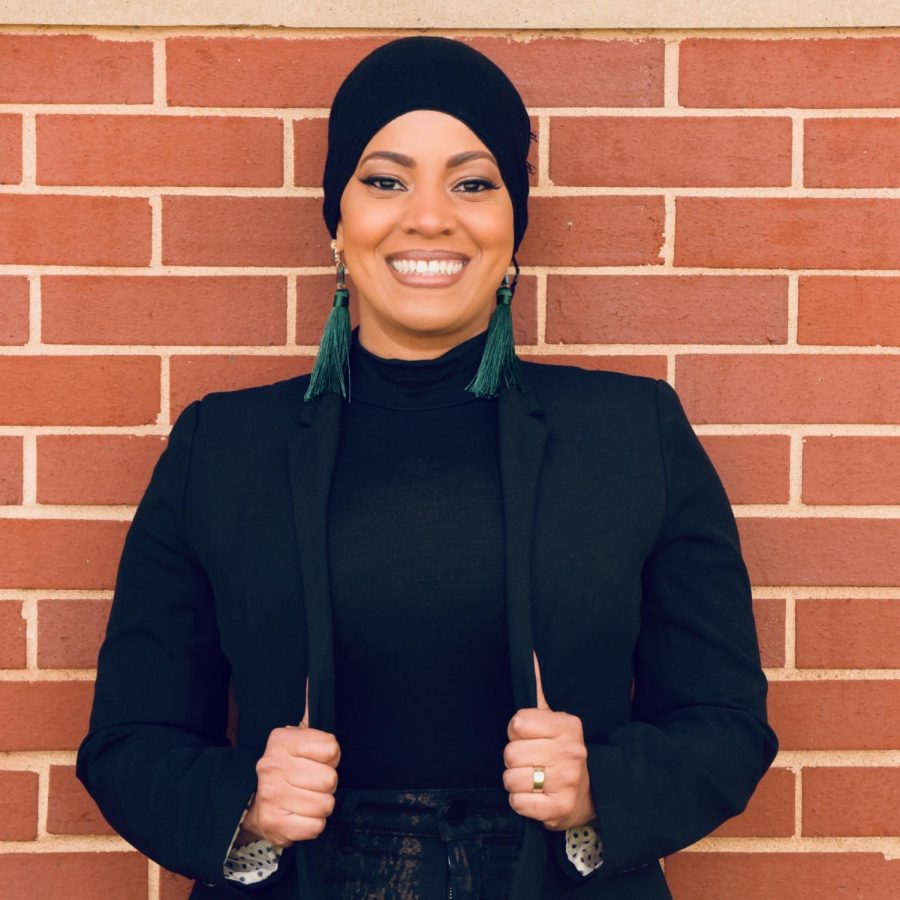
I’m running for City Council because I believe that we can actually put power back into the people’s hands if we equip our constituents with the tools to navigate resources in local government while creating a platform to monitor, measure vocals or understanding the job description, and truly create transparency in a way that folks can feel [that] they understand and that it’s accessible. They can utilize the services or advocate for themselves.
I think a very important part about my background is that my mom left us at four years old for the American dream, you know, for a better life. My uncle, Luis, was only 15 at the time, and he became the sort of a caretaker to myself, my brother, my sister, and his six brothers. Later, we found out that [my uncle is] a gay man. In Cape Verde, West Africa, at the time, it was oppressive, and he could not be himself or live his life for himself. So, for him to have suppressed that about himself and sacrificed so much to take care of his siblings and his nieces and nephew really spoke volumes about the man he was. Later, my uncle was killed by a drunk driver in Cape Verde while trying to open some sort of respite home for the LGBTQ community there. It’s kind of a sad story that adds to the journey, and we learn to be grateful, but [there are] still painful moments that I carry with me because my uncle was everything to me.
And so, I came to [the US], I’m living in Roxbury Academy homes, I’m with my mom. She was a teen mom herself. Having come to the US and leaving her three children behind, you could just imagine. By the time I got here, six years later, and I’m 10, she’s depressed. She doesn’t know how to access resources and, at some point, did not work for very long. I would go on to, believe it or not, deliver a baby when I was 12 years old.
We got stuck in my grandmother’s home. My aunt was like wait for my uncle, and in the projects, there’s like the catwalk, and the paramedics would be scared to come in the back, so I had to deliver the baby. Then, I had to come out and hold [the paramedics] hand like, ‘Come on! Let’s go through this way,’ and bring them to the house for them to take us to the hospital.
From that attention, you know Mayor Flynn gave me an award; it was like newspapers, radio and TV. I had also written for some Boston Herald writing scholastic competition, and I had won three times in a row. So, all of that, I think somehow, Barbara Bullett had come to see the articles. She reached out to me and then became my mentor. As a Black, African American woman, she taught me what it meant to be a Black woman in this country. She became my mentor, my best friend. Later, I would reveal to her that I don’t have a green card. She would look out for me, still.
I became the provider [for my family]. By the time I was 15, I knew I had goals; my brother and sister still hadn’t come here. I remember my uncle putting me on the plane and saying, ‘Don’t forget your brother and sister.’ So, I met a friend of a friend, a booster, who would sell me expensive stuff, and I would save it, and by the time I was 15, I turned that into money. I sent my mom back home to get my brother and sister. When they reunited with me, I was working. I worked at Roxbury Multi-Service Center. I worked for Massachusetts Alliance for Portuguese Speakers MAPS doing a child’s social work, they called it, but it’s really wraparound services for non-English-speaking clients that needed trauma-informed services or wraparound services for GCF. Then, I worked for Dimmock Community Health, where I became a certified HIV tester and counselor.
I would work with sex workers on Blue Hill Ave and provide needle exchange, STI or HIV safety kits and stuff like that in the workshops. I went on to work for Project Hope with the homeless population. I would do transition to work, so, career path for homeless women, and teach ESL to non-English homeless women. Eventually, with the natural progression, I became a mental health provider. I would do mentoring and intensive care coordination. After seven years of doing that, I was like, “Hey, you know what, I’ve always loved fashion. I need a small break.” I became an entrepreneur, and I opened a store. I’m self-taught. I went to YouTube University and taught myself how to sow and started selling, and then I was like, “Well, these gowns need to tell a story.” So, I ended up opening and developing a theatre production company where I would bring urban theater to Boston. I would create a platform, a positive outlet for youth to express their art. I wrote, directed and produced plays that would focus on mental health awareness, so, educating the public on mental health through performance art. And I, of course, would be my own costume designer.
Then I would get engaged with community street fashion. I put together interfaith galas for Christians, Muslims, Buddhists, and Jews to come together and just have a good time. I would do a float for the West Indian carnival; it was a banner about where we are all people, all African diaspora, come together, and they would have found their spirit through Wakanda. Through all of that, I met the previous director of Bowdoin Geneva Main Street, and she told me she was leaving and introduced me to…you know, I was doing my entrepreneurial stuff for a while, but she said, “This is what you’re doing. You are a small business owner, and you would understand this. You should step into this job.”
I interviewed, and that’s where I am now. I’m the director of Bowdoin Geneva Main Street, where I support with technical assistance, small business segments business or any kind of like loan applications.
When we look at the issues of disparities in the community, we need to think about economic integration as the crux of all the problems. We really don’t have safe spaces for the Black LGBTQ population, especially youth. We don’t have safe spaces for us, as Black adults, period. And so, we need to create, and we need to push policies or develop more programs that will make those safe spaces. More arts and entertainment spaces for both youth and adults, and look at equitable ways to support small business owners with entertainment licenses and full liquor licenses.
So that’s my background; not getting into the fact that I was a foster mom of 17 children and trying to live out my uncle’s legacy to be an open-hearted person, open my home to others, right and not delving into the other things I’ve done. I think I should just stop there and you can ask me more questions.
What are the most important policies on your platform?
The biggest issue for Boston, I think, is housing. So that’s huge because if we can’t secure our home, if we can’t secure our shelter, then we can’t focus on homework, we can’t focus on work, we can’t focus on family life. I believe that we really should focus on the inventory. So stabilizing rent is to create innovative ways of increasing homeownership opportunities, and therefore creating generational wealth. Therefore, investing more in our community, because if we own, we’re investing in our gardens and taking care of our surroundings. I believe that we also need to create more incentives; so, tax incentives for residents, even if you are a landlord, that you should receive a tax incentive to support if you live in Boston. Or even mantra ideas, so the government collaborates with nonprofits to create those Land Trust opportunities for community members. I think also rent to own is one way that we are not, or at least Boston hasn’t done a lot of if there was any. If you’re paying your rent and want to own it, why not look into your rental history as the credit? As opposed to allowing oppressive credits to hurt your chances of buying a home. I think we should look at all of that. There are different opportunities and possibilities to close the wealth gap, create generational wealth, and build an equitable way. So, incentivizing developers or actually mandating developers to increase the amount of subsidy they have to develop in those buildings. It shouldn’t just be 13%. I would even dare to say up to 25%. I think that the city can work with developers to make sure that it makes sense, budget-wise.
If elected to office, how do you plan to implement the policies and things you’re promoting on your platform?
So, great question. Many of us, especially in local elections, see how much of a detriment we face in voter turnout. One of the issues with that is, people, or at least what I’m hearing from people as I speak to them, have been that people don’t believe that local government is effective or that their vote matters. A part of voter turnout and a part of holding any elected or just navigating local government or navigating resources is understanding how it works, what it does, who does it, and where to get it.
The City Council is charged with overseeing the budget, right, or approving it or disapproving it; Make that process a community participatory process to create more transparency and accountability. The other part of it is its constituent-based, heavy, right. So, if we are to work with constituents, and most of the issues will be what service, resources… we then have a responsibility with anything, with any relationship. You know what your role is; I’ll know what my role is. If you know what my role is and you know what I’m working on, and you know who I’m doing it for, and you know where to go to monitor what I’m doing, then that’s transparency, right, because then you know what to hold me accountable for. So, education, I think, is the best approach, or empowerment is the best approach to begin to work on these issues. I would suggest repeatedly campaigning to put the power back into the people’s hands and create some sort of package that you can walk through or go through with your constituents. I’m talking about all innovative ways of communication. Not just sign up here. I’m talking like reach them at their school, go to the farm, go to the clergy, churches, the community centers, everywhere. Send mail, canvass again, door knock again. Be creative, but reach people.
People will say, “You come one time, and then you’re not going to come again.” I hear this, and I’m saying, “How the heck do I say things like catchphrases, like hold me accountable and transparency,” when I’m not even starting the conversation about what this is? Still, it becomes a longer conversation that I think can be done more strategically. In a more critical thinking approach, it would be creating a package where you walk people through and explain the job description, not just to me but to all the electeds that I would be collaborating with. This is my first time running, but I hear this. Also, let’s say that I create a platform for you, and I’ll tell you that all my goals are measurable, and you be the judge of that.
The community should be able to say what’s not measurable or realistic. So, how does the community engage in a thing or hold anyone accountable when they can’t begin to have the conversation about what we do and how we’re doing it? Where are we doing it, or how to even use the service? I think the first approach would be that. And secondly, it would be to create allies. I can’t do this alone. It would be some sort of association that would hold me and the local government accountable. All of us are accountable; All these kind of different areas that together make up a holistic view or holistic information on what the constituents or the community needs. Then me working with them as a partner would then support me in providing research and the facts. We want facts to be able to say this is why we need this policy. I’m with the people. I’m planted in the community. I also have research, and I also have allies that together as a community, we can move forward.
On the other way, I would say that Boston being super, at least District 7, I think, feels very segregated. If you look at it, there are huge opportunities for us to get to a holistic community healing approach. We can actually benefit from the tourist market, where we can create opportunities for the different cultures to intersect; where the duck tours should go all the way to the African American Museum, all the way through Roxbury, all the way through Grove Hall, all the way through. Franklin Park. And if they do already, they should be in a way where you come to an afro-centric district in our neighborhood. You come to the Latinx quarters, right, you come to the Islamic whatever right that you come to the, you know, that the Christian whatever; the tours come through, and we have pop-up shop days. We can block all these streets, create opportunities for cross-marketing and raising funds, and bring different income streams to our business districts.
We should be able to go to Nubian Square and shop for everything I need. I should be able to buy my food. I should be able to buy my fruit. I should be able to buy a shirt. I should be able to get my dry cleaners… all in one district. I should be able to do that. My dollars should go into the businesses in my community. We should be able to support each other and encourage more local cross-marketing to boost the economy. I think that’s what I’m getting at… is information back into the constituents’ hands for accountability purposes and learning how to navigate resources and hold local government accountable by creating some sort of allyship group that will back me in research and accountability, as well as developing ideas from best practices and research.
So how would you say that your campaign is different from other candidates that are running for District 7?
Honestly, I try to focus only on the work. Keep your head down and work hard. Work smart, but also work hard. And I would say that I’m not afraid to work. I feel that I invest a lot of time into connecting with the community. A lot of my campaigning consists of high door knocking, and a lot of it also consists of meeting business owners; a lot of it also consists of senior homes; a lot of it is community centers. You really have to invest in the constituents, connect with people, and hope that you get elected and build that continuity. It’s different in a way that we’re not afraid of work, and we are working hard, and I would dare to say that we’re probably the hardest working. I think that’s kind of the message they are saying about me, not me saying about myself. But, hey, you know, God knows best. I don’t know. I only know about my campaign. I know that I care and that my lived experiences and my work skills have given me an open mind to work with different communities and to be able to give even when I don’t receive any gratification or any credit for it. It’s important when you focus on the work, and it’s not about you. It’s important to understand that you know this is serious. Our people are dying. We’re dying because we don’t eat well because we don’t have food access.
We don’t have food access because we don’t have the job and the time to invest in healthy foods. There are so many issues, and that’s just about our eating habits. The list goes on and on. Our safety issues, I’m a mother of two sons. I’m a mother of two Black sons. I bet any woman in a densely populated urban setting can tell you that her biggest fear is when her Black son walks out the door. The hardest thing to do in America is to either be a Black man or raise a Black son. It’s tough or just as tough for women, as well, for Black women because we’re the most underrepresented and disrespected and neglected for us.
I’m sure this is a shared fear. And I think that’s the driver; you see how serious this is. It’s not a game. The city is repressed and racist or systemically racist. And so, we must be serious about the work. And we must get to a point where we say that we have to focus and do the work. To do that, we must cleanse ourselves, heal, and speak truth irrespective of the audience—no matter who is listening to us. We have to build our courage, and we have to build each other up. We have to cover each other when we’re left and gracious. We have to hold each other’s hands and uplift each other and move forward. We must do this work. It’s that serious. It’s no longer trivial.
What do you like about District 7, and what do you think can be changed?
Don’t let anybody fool you, alright? Everybody loves the ghetto. Everybody. And ghetto is a word of endearment. Right. You’re gonna quote me, and this may sound weird to some. We are, at Roxbury… we have wealthy families, wealthy Black families, wealthy white families, wealthy Latino families, but the point is that in the area’s more marginalized, poor communities. I’m here to fight for that population to ensure that everyone’s human rights are respected. The thing that I love about District 7, I mean I went to Snowden High School my freshman year before I went to O’Bryant, so, of course, that I was in the South End as a teen, roaming around. But so you have all of the different variety and the diversity, but when you walk into Roxbury… it’s home. And it feels amazing. I also love architecture, the old Victorian homes and the shops, the cobblestone in South End. I love all of it. But what feels like home is when you see a senior African American woman smile at you and say, “Good morning, baby.”
You know you’re safe. You know you’re loved, and that’s a beautiful feeling.
Is there anything that you want to say to our readers that I haven’t asked you about today?
You know, I’m not very good at talking about myself, per se, but what I say to people all the time when I ask them to vote for me is that that they really give themselves a chance by making sure that the process is not just, for example, I knocked on a door. What I’m trying to say is that I knocked on the door [once], and this woman just said immediately, “Yeah, I got you. I’ll go vote for you,” and I said, “Wait. You deserve more. Can I please talk to you a little bit? Can I please explain to you what this is? Can I please tell you why you should vote?” And I did that. I would say to the readers, everyone dealing with something… what affects you, affects me. So, we are all essentially the same. The lessons take different colors and turns and twists, but essentially, we are all the same. Even when folks carry their guilt and compensate it with either a savior complex or compensate it with other ways, right. But you see that people are affected to see that people have some level of like consciousness, it’s affecting them. And we know this because we’re human, and we share that, and I believe that we have to move forward with the truth. People have to say I’m sorry for the pain caused to those who have suffered and endured it. There is no reconciliation without truth. To be honest about the healing process, about economic integration, about moving forward, as a society, or building a community, we must speak the truth. I hope to be able to create some of those opportunities.
Editor’s note: This interview has been updated to include Lorraine Payne Wheeler as a candidate running for District 7. Her name was previously not included in the line-up.


